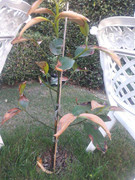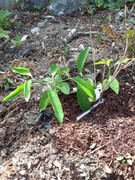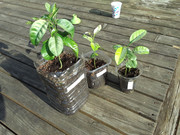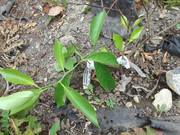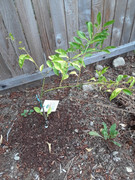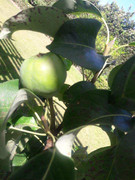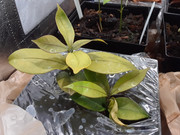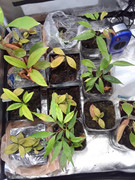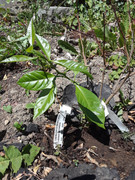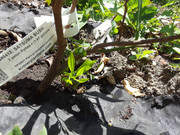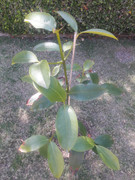1151
The Tropical Fruit Forum
Uniting Growers Worldwide!
News:
We are looking for Facebook editors for the forum's Facebook page.
This section allows you to view all posts made by this member. Note that you can only see posts made in areas you currently have access to.
1152
Citrus General Discussion / Re: Mexican lemon tree Advice
« on: July 20, 2018, 02:01:14 PM »
In your climate it has been very hot and dry the last month. Keep it consistently watered, and try to water deep (keeping the soil moist but give it a chance to partially dry so it isn't constantly waterlogged).
1153
Cold Hardy Citrus / Re: Long term cold hardy citrus breeding project
« on: July 19, 2018, 07:52:16 PM »Those made me think it was easy, but for all I know they resulted from thousands of attempts.I think the main barrier, in many citrus types (and this tends to be particularly true for hybrids) is a high percentage of nucellar seeds, which means that the majority of the seeds grown will be genetic clones of their parents. Grapefruits tend to be somewhere around 70-90 percent nucellar, for example.
That means you have to grow all the seedlings and you may not know if any are actually hybrids until much later when they begin producing fruits. Although of course there are several strategies to be able to help identify seedlings that are different from their parents.
For example might be using trifoliate citrange pollen on a grapefruit as the female parent. If any of the seedlings have trifoliate leaves, you know they are citrange-grapefruit hybrids. Or possibly the reverse of that could be possible: If any seedlings from a citrumelo don't have trifoliate leaves than they are probably hybrids of the other pollination parent that has ordinary leaves.
Another topic with more information on which citrus types tend to be nucellar: "Thread for Citrus Breeders"
http://tropicalfruitforum.com/index.php?topic=24518.0
1154
Temperate Fruit Discussion / Re: hybrids between quince, pear, and apple
« on: July 19, 2018, 07:37:08 PM »
zone 10
and I think it's solid zone 10, on the border between 10a and 10b
and I think it's solid zone 10, on the border between 10a and 10b
1156
Tropical Fruit Discussion / Re: Mulberry and Lychee recommendations.
« on: July 18, 2018, 03:46:53 PM »
There's really all sorts of advantages and disadvantages, and it probably comes down to personal preference.
For best mulberry flavor I'd choose Persian Black.
I think Brewster has the best flavor, but there's a lot of individual preference surrounding this. Hak Ip is supposed to have exceptional flavor, if you can tolerate a slightly medicinal note. But of course it may not produce regularly, and some have found it finnicky to grow. Mauritius has a cinammon subacid taste that I don't especially like in a lychee, but for some people that's their favorite tasting variety.
For best mulberry flavor I'd choose Persian Black.
I think Brewster has the best flavor, but there's a lot of individual preference surrounding this. Hak Ip is supposed to have exceptional flavor, if you can tolerate a slightly medicinal note. But of course it may not produce regularly, and some have found it finnicky to grow. Mauritius has a cinammon subacid taste that I don't especially like in a lychee, but for some people that's their favorite tasting variety.
1157
Tropical Fruit Buy, Sell & Trade / Re: Galbanum / Ferula gummosa (synonym F. galbaniflua) seeds wanted
« on: July 10, 2018, 05:13:59 PM »
Which species of Frankincense do you have?
Is it B. sacra, or B. carterii, or are you not sure?
You can order galbanum essential oil online. It's used (in very small amounts) in perfumery. It smells very intense and "green", although I don't particularly care for it.
Is it B. sacra, or B. carterii, or are you not sure?
You can order galbanum essential oil online. It's used (in very small amounts) in perfumery. It smells very intense and "green", although I don't particularly care for it.
1158
Citrus General Discussion / Re: The Fragrance of Citrus in Bloom
« on: July 10, 2018, 05:00:38 PM »Being that the cross is nucellar seedling of Miyagawa from a controlled pollination with Poncirus trifoliata I'm surprised that it has such a sweet and pleasant taste due to the P. trifoliate parentage.If it's a nucellar seedling, then it wouldn't actually have any trifoliate ancestry.
In some cases, pollen from another citrus variety can induce fruit set, but those seeds in the fruit will not necessarily have genetically arisen from the genes in the pollen.
You might read the topic "What happens if you try to breed Triploid citrus" for further information.
"Nucellar" generally means the embryo arose from the surrounding seed coat (rather than the zygotic germoplasm) and is a genetic clone. Although of course sometimes there are mutations, and sometimes "nucellar" can (not completely technically correct use of the word) refer to multiple seedlings arising out of the same seed, even though sometimes one of the seedlings is zygotic (result of sexual recombination).
1159
Citrus General Discussion / Re: Try to save or throw in the towel?
« on: July 10, 2018, 04:55:18 PM »
Satsuma does tend to be a fairly resilient variety.
And keep in mind, the flavor of the fruit only tend to improve with age.
And keep in mind, the flavor of the fruit only tend to improve with age.
1160
Citrus General Discussion / Re: Pictures from middle Georgia
« on: July 10, 2018, 04:52:11 PM »
How does dekopon handle the Winters in zone 8a Georgia?
Is it generally as hardy as other mandarins?
Is it generally as hardy as other mandarins?
1161
Tropical Fruit Discussion / Re: Andaman islands Trip
« on: July 10, 2018, 04:27:10 PM »
Don't get eaten by the natives.
The Andaman islands hold interest from an anthropological perspective too. In extremely ancient times it is believed India and the entire Southeast Asian region was populated by a primitive people similar to the population still remaining today on the Andaman islands.
(Early Twentieth Century anthropologists classified them into their own race, Nigritos, the last remaining remnants of which today are rapidly dying out and may effectively become extinct)
The Andaman islands hold interest from an anthropological perspective too. In extremely ancient times it is believed India and the entire Southeast Asian region was populated by a primitive people similar to the population still remaining today on the Andaman islands.
(Early Twentieth Century anthropologists classified them into their own race, Nigritos, the last remaining remnants of which today are rapidly dying out and may effectively become extinct)
1162
Cold Hardy Citrus / Re: a few pictures from the Pacific Northwest
« on: July 10, 2018, 04:07:28 PM »1163
Cold Hardy Citrus / Re: a few pictures from the Pacific Northwest
« on: July 10, 2018, 03:38:10 PM »
Ideally I should have waited until they were bigger, but I worried if I didn't get them in the ground they might not survive. I haven't been very good about maintaining them well in small containers.
In small containers they need constant attention and care to make sure they don't dry out (and they don't do well with waterlogged soil either). I just have way too many of them to put in larger containers.
The Winters here can actually be pretty mild (though long), so I'll just have to hope the small ones can survive. They have a much better chance in the ground than in a container if they're going to be left outside. The cold here mostly stays slightly above freezing. This January I went out and there were a lot of camellias in bloom, and there were even a few blooms on my rose bush (though they didn't look so well), though it was an unusual Winter this year. There are some people in the neighborhood growing bananas (the ornamental kind) outside.
In small containers they need constant attention and care to make sure they don't dry out (and they don't do well with waterlogged soil either). I just have way too many of them to put in larger containers.
The Winters here can actually be pretty mild (though long), so I'll just have to hope the small ones can survive. They have a much better chance in the ground than in a container if they're going to be left outside. The cold here mostly stays slightly above freezing. This January I went out and there were a lot of camellias in bloom, and there were even a few blooms on my rose bush (though they didn't look so well), though it was an unusual Winter this year. There are some people in the neighborhood growing bananas (the ornamental kind) outside.
1164
Temperate Fruit Discussion / Re: Has Anyone Successfuly Grown Hardy Kiwi in coastal Southern California?
« on: July 09, 2018, 09:02:19 PM »
I'm not sure why anyone would want to grow hardy kiwis in Southern California when you can grow better tasting regular kiwis.
That said, I think it is likely they can probably grow.
But keep in mind all kiwis can have a lot of difficultly growing in hot dry conditions. You might want to plant in partial shade, in a spot where the wind is less likely to blow away all the humidity, and keep it consistently watered. Southern California has a different heat level than the climate that you're used to, and you will likely have to adjust everything you know and adopt different gardening practices.
That said, I think it is likely they can probably grow.
But keep in mind all kiwis can have a lot of difficultly growing in hot dry conditions. You might want to plant in partial shade, in a spot where the wind is less likely to blow away all the humidity, and keep it consistently watered. Southern California has a different heat level than the climate that you're used to, and you will likely have to adjust everything you know and adopt different gardening practices.
1165
Cold Hardy Citrus / Re: a few pictures from the Pacific Northwest
« on: July 09, 2018, 08:20:55 PM »1166
Cold Hardy Citrus / a few pictures from the Pacific Northwest
« on: July 09, 2018, 07:55:17 PM »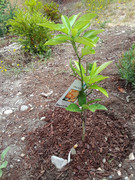
Bloomsweet grapefruit
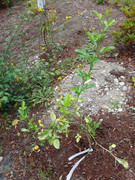
Duncan citrumelo
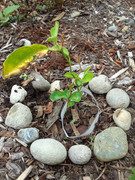
Keraji mandarin (small seedling)
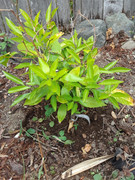
I was told this hybrid (on grafted rootstock) was originally grown from a seedling that was some sort of hybrid that included C. ichangensis and Minneola tangelo in its lineage. It's very probably a M.I.C.
I don't have all the info about this variety, but it's very likely the result of several select hybridizations by cold-hardy citrus grower enthusiasts over many many years, a real labor of love. I'm expecting it will have a good balance of cold hardiness to edibility.
I'm in zone 8a, but we have a long cool season that doesn't really begin warming up until late May. So the growing season for citrus is very short.
Just thought some of you might be interested in some unusual varieties of cold-hardy citrus growing in a part of the country people normally don't try to grow citrus. (Olympia, WA)
Right now it's humid, overcast, and warm, but it hasn't significantly rained for the last few weeks. Very low precipitation in the Summer.
1167
Temperate Fruit Discussion / Re: hybrids between quince, pear, and apple
« on: July 08, 2018, 08:49:06 PM »1168
Tropical Fruit Discussion / Re: mangosteen and lychee, growing in warm enclosure
« on: June 27, 2018, 05:19:25 PM »1169
Cold Hardy Citrus / Re: Clemyuz 3-3, ten degree tangerine
« on: June 26, 2018, 11:34:44 PM »ClemYuz 3-3 is also known as Ten Degree tangerine. Its principle downfall, is that it matures so very late (around Christmas) therefore the fruit is frequently damage by November and December freezes.It may hold some value to further breeding though. I was thinking a cross with an early ripening mandarin like Fallglo or Xie Shan.
1170
Cold Hardy Citrus / Re: Clemyuz 3-3, ten degree tangerine
« on: June 26, 2018, 07:40:14 PM »
Yuzu is actually very cold hardy, but perhaps more important than that it's also very vigorous growing and can bounce back after damage, or in more northerly climates start growing soon after temperatures begin warming up.
Clem-yuz is noticably less vigorous than yuzu though.
Clem-yuz is noticably less vigorous than yuzu though.
1171
Cold Hardy Citrus / Re: Arctic Frost beginning to come back
« on: June 26, 2018, 05:17:36 PM »I planted 3 Arctic Frost last spring. They did well during Winter and are growing well,Yes, but I'm in the PNW. The winters here are probably just a tiny bit milder than where you are, and we don't really have cold snaps, but the big issue is the prolonged cool to cold temperatures that last so long throughout the first part of the year. Some say it's almost like we don't have a real Spring season. The citrus did not really begin showing any signs of growth until late May to early June, with the exception of a Satsuma mandarin that was covered in plastic sheeting in a cold frame, when we had a short bout of unusually warm temperatures in April.
I'm not concerned as much about the Winter freeze as I am the constantly cold temperatures that follow for months afterwards. None of this cold is actually freezing, but it seems the citrus have difficulty dealing with it and it does cause leaf drop. I do expect, however, that once every 4 to 8 years there might be a really cold winter, but even those wouldn't be anything unusual for zone 7.
The problem isn't so much cold events, it's overall lack of warmth.
1173
Cold Hardy Citrus / Arctic Frost beginning to come back
« on: June 26, 2018, 03:21:27 PM »
planted out in the ground in mid-March, while the little tree was just beginning to set fruits. The tree could not take the cold temperatures (not freezing though) and completely defoliated, all except one tiny leaf. Most of the branches died back.
But now it's beginning to push out growth.
Pacific Northwest, zone 8a
(will have to show pictures later, it's too slow right now)
But now it's beginning to push out growth.
Pacific Northwest, zone 8a
(will have to show pictures later, it's too slow right now)
1174
Tropical Fruit Discussion / Re: Breeding Cherimoyas/Atemoyas?
« on: June 25, 2018, 01:23:53 AM »
I may be wrong about this, but it was my understanding that Atemoya originally came about from a cross between A. squamosa (Sugar Apple) and either Cherimoya or A. reticulata (Custard Apple).
1175
Tropical Fruit Discussion / Re: giving mangosteen a try in Southern California
« on: June 24, 2018, 09:53:29 PM »SMF spam blocked by CleanTalk

